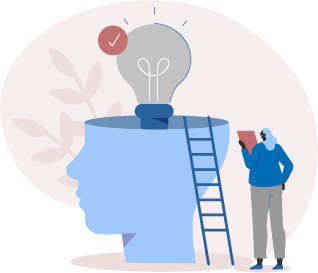5 tips for combating imposter syndrome in academia
Imposter syndrome has become a widely discussed topic in the working world over the last decade. Now, imposter syndrome in academia is becoming increasingly recognized as a challenge for researchers around the globe.
But what exactly is imposter syndrome? And is there anything you can do about it? This blog answers your key questions and brings in expert advice from our podcast for researchers on the same topic, which you can listen to below.

Read the Overcoming impostor syndrome podcast transcript.
What is imposter syndrome in academia?
There are lots of different definitions of imposter syndrome, but it’s summarized succinctly in our podcast.
“I’d describe it as thinking that others may have an inflated sense of what your abilities are,” says Dr Katryna Kolawsky, a postgraduate researcher and student development officer at Loughborough University. “Or a worry that you may be found out because you feel like a fraud.”
Post information
Related posts
While it’s incredibly common across a variety of professions, imposter syndrome in academia has become increasingly talked about among researchers. Let’s take a look at why that is.
Why do researchers struggle with imposter syndrome?
“I think there’s a bit of an acceptance that [imposter syndrome] is part of the deal, that this is part of becoming a researcher, this is part of becoming an academic,” says Lydia Mantay, whose PhD was on the topic of researcher identity development of PhD students and who features on our podcast.
“I still felt like that, even when I submitted my PhD. I knew its weaknesses, I knew exactly what examiners could be coming back to ask me to rework. I knew what else there is to know that I don’t know yet. That’s the nature of research, isn’t it? We always strive to know more and the more we know, the more we know that we don’t know anything.”

The world of research, particularly early on in your career, can be an incredibly daunting place. You’re often working closely with people who have years of experience and you’re required to do activities that can feel quite scary, especially to start with. Going to conferences, facing hostile questioning, writing your first papers, going through peer review, dealing with rejections, and competing for funding. These are all challenges, especially the first time around.
“You’re surrounded by lots of experts, perhaps people that you aspire to be,” says Dr Katryna Kolawsky. “Lecturers, senior lecturers, professors. But you won’t know what their journey has been – most people don’t announce times when they’ve hit hardship within academia. You only see the positive.”
When it comes to tasks like peer review, early career researchers often need to develop a “thick skin”, as Dr Kolawsky puts it.
“If you’ve invested a lot of time and effort, blood, sweat, and tears into a topic and you’re putting yourself out there, whether it is in a publication or going to a conference, you might feel a little bit apprehensive about the questions [you could be asked],” she adds.
Finally, there is more pressure on researchers today to learn a variety of transferable skills which can increase the sense of failure when you feel that you don’t have these skills.
“Now a researcher has to develop a series of skills that maybe she or he didn’t imagine would be necessary in research,” confirms David Uribe, from the European University Association, another podcast interviewee. “Communication skills, team leadership, project management, marketing, entrepreneurial skills. These are now necessary to be a researcher.”
5 top tips for combating imposter syndrome in academia
Want to know how to deal with imposter syndrome in academia? We’ve put together these top tips with research and the invaluable advice of our podcast interviewees.
Tip 1: Acknowledge how you’re feeling
Combating imposter syndrome isn’t about ignoring it. Instead, it’s important to acknowledge how you’re feeling and to realize that it’s common and nothing to be embarrassed about.
“It’s a part of natural reflection, looking at who you are,” agrees Dr Mark Proctor from the University of Sunderland, another podcast interviewee. “When you start something new, something you’ve never done before, then you immediately question yourself and your abilities.”
Tip 2: Talk to others
If you take a leap and share your experiences with others, you may be surprised by just how many of your peers feel the same.
“I’d say talk to others, be honest with how you feel” confirms Dr Kolawsky. “Chances are that others are feeling the same way as you and hopefully that will encourage you and give you some confidence in yourself.”
Speaking to trusted lecturers and tutors may also help, even though it may feel awkward at first. Most faculty members will have experienced imposter syndrome at least once in their academic career, so they could be a great source of first-hand advice on how to cope with it.
Tip 3: Seek out feedback (it might be better than you think)
Trusted lecturers and tutors are also great people to approach for feedback on your work. If you’re doubting yourself, it can be scary to ask for feedback, but often it’s the best thing you can do to boost your confidence.
Getting a clear picture of how you’re really performing, rather than imagining the worst, will make it easier for you to have confidence in your abilities. And even constructive feedback about where you can improve is useful in this regard as it will give you a focus on where you do need to work to improve your skills.
Tip 4: Take time to acknowledge your achievements
It’s all too easy to look ahead to what’s coming, rather than recognizing the many achievements already under your belt. On top of that, many people struggle to focus on positive feedback and instead home in on any perceived criticism. That’s why it’s so important to take time out to acknowledge when you have done something well.
“Be kind to yourself, pat yourself on the back when things are going well,” agrees Dr Proctor. “If you’re feeling a little low, then remember what you’ve accomplished already.”
Tip 5: Look for a mentor
Researchers today are expected to have a whole range of skills – as we heard from David Uribe earlier. To fight impostor syndrome, you can try actively improving your hard skills and soft skills. That way, whenever you feel you’re not good enough at something, you can feel confident that you’re improving your skills.
A great way to do that is to find a mentor. This might be something that your institution offers already, or you may need to do a little work to find the right person. Who you choose will depend on what skills you’re most keen to develop, but don’t limit yourself to looking for people in your field.
“When I [advise looking at] mentoring, I’m not saying scientific mentoring,” confirms David Uribe. “Instead, [try looking for] another professional that is providing advice beyond scientific activity. For example, an industry expert, a businessman, or an alumna could provide this kind of mentoring.”

Where to next?
If you’ve found these tips helpful make sure you listen in full to the podcast episode. And for even more helpful tips, you can look at:
Our podcast series for researchers – 15 minutes to develop your research career (which includes the episode mentioned in this post).
Our Insights newsletter – the latest news, tips, and resources delivered straight to your inbox.